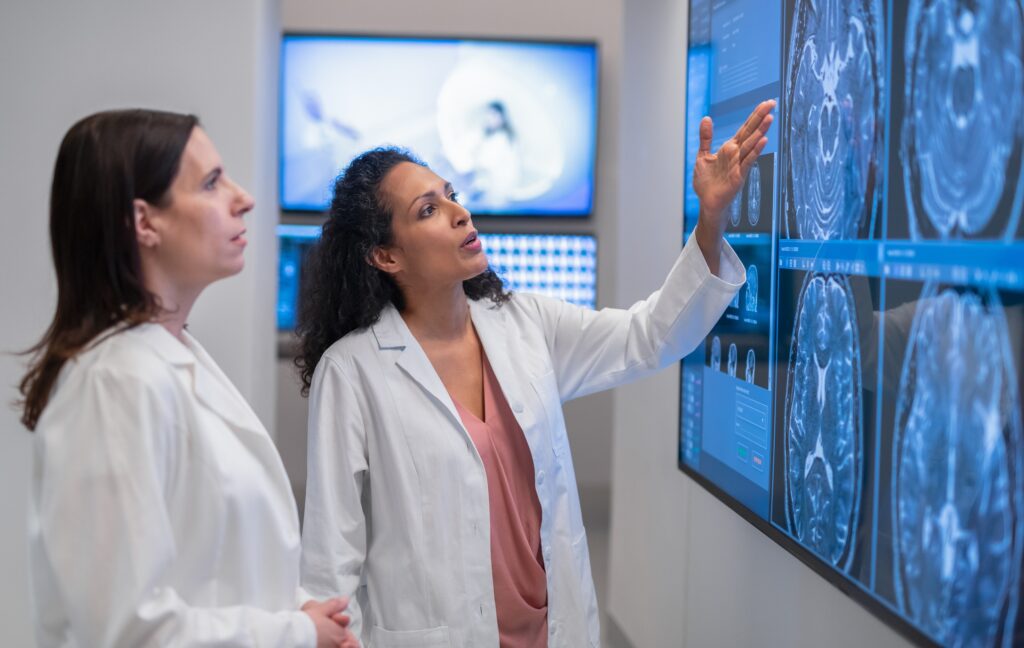Expert neurological care and stroke treatment in East Texas
At UT Health East Texas, our neurology specialists are dedicated to providing exceptional neurological care services for conditions affecting the brain and nervous system. As the first hospital in East Texas to establish a certified stroke center, UT Health Tyler is recognized for its comprehensive stroke care, certified by the Joint Commission. Our network extends across multiple locations, including Athens, Henderson, Pittsburg, and Quitman, forming a robust regional network for acute stroke treatment. Whether addressing complex neurological disorders or providing routine brain health maintenance, our team utilizes cutting-edge technologies and innovative treatment protocols to enhance patient outcomes.

Comprehensive stroke care at UT Health Tyler
Our flagship stroke program at UT Health Tyler is certified by the Joint Commission as a comprehensive stroke center. The first hospital in East Texas to have a certified stroke center, the program has gone on to receive recognition and awards for their effort to ensure high quality care. Other UT Health East Texas stroke certified locations include Athens, Henderson, Pittsburg and Quitman. These facilities are designated support stroke centers.
Together, these facilities create a regional network of stroke treatment programs ensuring our patients receive the needed treatment when it matters most.
For more information or to schedule an appointment, please call the UT Health East Texas Neurological Institute at 903-594-2958 or 1-800-728-2702.
Stroke signs and risk factors
A stroke occurs when the blood supply to the brain is interrupted or blocked, reducing the flow of oxygen and nutrients to the brain, which can result in damage to brain cells. Stroke is the leading cause of adult disability and the fifth-leading cause of death in the U.S.
Recognizing the symptoms of a stroke is one of the best ways to ensure fast, effective treatment. One way to remember the most common symptoms is to BE FAST:
- B – Balance. Is the person suddenly having trouble with balance or coordination?
- E – Eyes. Is the patient experiencing sudden vision troubles? This includes blurred vision, double vision, or loss of sight in one or both eyes.
- F – Face drooping. Ask the person to smile. Is one side of their face numb or drooping?
- A – Arm weakness. Ask the person to raise both arms to the same level. Does one arm drift downward? Is one arm weak or numb?
- S – Speech difficulty. Ask the person to say a sentence. Are they struggling to speak normally?
- T – Time to call 911. If the person is experiencing ANY of these symptoms, call 911 immediately.
If you can avoid a stroke before it happens, that’s even better than fast treatment. Risk factors such as age and family history can’t be changed, but certain changes in lifestyle can help control and reduce the risk of stroke.
The following lifestyle factors increase a person’s risk of experiencing a stroke:
- Being overweight
- Circulation problems
- Cigarette smoking
- Excessive alcohol consumption
- High blood pressure
- High cholesterol
- Lack of physical activity
- Poor nutrition
Interventional neuroradiology
At UT Health Tyler, a team of neuroradiologists and interventional neuroradiologists use minimally invasive procedures to diagnose and treat a range of disorders involving the brain, head, neck and spine. Specializing in the growing field of endovascular medicine (procedures done through blood vessels), they provide treatments that make neurosurgery safer or eliminate the need for surgery altogether.
Working closely with neurologists, neurosurgeons, oncologists, otolaryngologists (ENTs) and other specialists, the neuroradiology specialists at UT Health East Texas advance care and enhance life for thousands of East Texans each year.
UT Health Tyler’s interventional angiography suite is equipped for endovascular management of a range of neurological disorders. Our physicians use innovative technologies, such as 3D imaging, percutaneous therapies and the Penumbra stroke system, to increase patient safety and reduce recovery time.
Conditions treated using interventional neuroradiology include:
- Aneurysm
- Arteriovenous malformation (AVM)
- Cavernoma
- Carotid artery disease
- Carotid-cavernous fistula
- Dural arteriovenous fistula (DAVF)
- Intracranial and extracranial atherosclerosis
- Nasal and sinus cavity disorders
- Spine compression fractures
- Stroke
- Subarachnoid hemorrhage (SAH)
- Tumors and lesions of the head, neck and spine
For more information about types of treatments available or for a physician referral, please call us.
Treatment for movement disorders
The UT Health East Texas Movement Disorders Center provides a continuum of brain and nervous system care that will guide patients and their families through the process of treatment and support for a range of movement disorders.
We treat the following movement disorders, including conditions like Tourette’s, Parkinson’s disease, obsessive compulsive disorder, restless leg syndrome, and more. Click here to learn more about our Movement Disorders Center.


